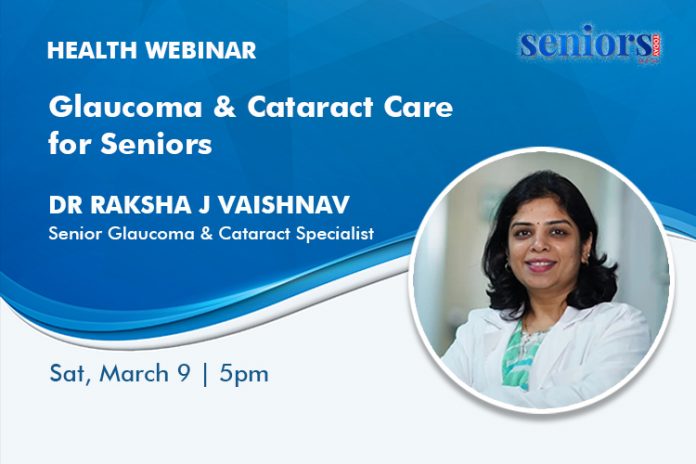On 09 March, 2024, Seniors Today hosted their weekly Health Live webinar with Dr Raksha J Vaishnav a Senior Consultant – Cataract & Glaucoma at the Nethradhama Eye Hospital, Bengaluru who spoke on and answered questions about Glaucoma and Cataract Care for Seniors.
Dr Raksha J Vaishnav is a Cataract & Glaucoma specialist with over 15 years of experience. She completed her MBBS from LTMMC (Sion Hospital), Mumbai; and DNB (Ophthal) from the world-renowned Aravind Eye Hospital, Madurai. She further did her Fellowship in Glaucoma (RGUHS) from Nethradhama Superspeciality Eye Hospital, Bengaluru.
Dr Vaishnav is a skilled surgeon and has vast experience in Cataract and Glaucoma surgeries. She has also trained and mentored several postgraduate students and Fellows during her tenure at different institutions. Dr Vaishnav is a member of BOS, KOS, DOS, AIOS and GSI and has presented posters at multiple national conferences.
She has also written newspaper articles and conducted several webinars for public awareness of Cataract and Glaucoma. Dr Raksha Vaishnav has also co-authored a paper on use of Artificial Intelligence in Ophthalmology.
The number of cases of glaucoma have increased over the years and the reason for that is increased awareness about the disease. Glaucoma is the number 3 most common cause for blindness still very few people know about it. Which is why every year a campaign is held to educate the people about glaucoma and another reason for the rise in the number of glaucoma cases is also the rise in the lifestyle diseases.
The number of cataract cases have also proportionately increased over the years.
The lens is the area of problem in case of a cataract. The lens is suspended by some ligaments.
Glaucoma is the disease which damages the optic nerve- which is going to the brain. It happens because when the fluid builds up in front of the eye, the extra fluid increases the pressure in the eye thereby leading to damage of the optic nerve.
The vision in glaucoma is initially affected from the periphery and later leads to central vision ultimately leading to complete blindness.
Glaucoma is irreversible and progression can only be altered and slowed by early diagnosis and treatment.
Types of glaucoma:
- Open angle glaucoma: More common
- Angle closure glaucoma
Whenever there is resistance in the movement of aqueous humor, it leads to rise in the back pressure and the pressure in the eye increases thereby causing damage to the optic nerve by angle closure.
Another cause can be when the iris moves forward and tries to touch the cornea. In this case too, the fluid is not able to move and bowing of the area is seen.
Similar to heart attack, there is such a thing as an eye attack which is called Acute Angle Glaucoma where in the fluid is unable to move at all and the back pressure will rise leading to loss of vision.
Risk factors for glaucoma:
- Glaucoma is a disease of the elderly. Age over 50 years
- Family history of glaucoma
- High myopia
- Trauma to eye
Signs and symptoms in glaucoma:
- Usually open angle glaucoma does not present with any signs and symptoms
- Watering of the eye
- Pain in the eyes
- Redness of the eye- are all seen in closed angle glaucoma
Glaucoma is also called the silent thief of sight. This means that there is gradual loss of vision but the patient does not realise that the vision is gone.
Tunnel vision is characteristic which means there is initial loss of peripheral vision followed by central.
Diagnosis of glaucoma is made by conducting the following investigations:
- Vision acuity is testes
- Intraocular pressure is checked
- Slit lamp examination of the optic nerve
- Visual field analysis
- Optic nerve head analysis
Treatment for glaucoma:
- Certain eye drops are used to reduce the intraocular pressure
- In case the pressure does not fall, certain lasers such as- argon laser trabeculoplasty, iridotomy
- Surgical alternative- trabeculectomy
- Shunts are also used to reduce the intraocular pressure
Preventative measures you can take to avoid glaucoma:
- Avoid smoking
- Avoid playing instruments such as the saxophone
- Avoid certain yoga poses such as shirshasana
- Reduce your caffeine intake
- Reduce your stress levels
- Deep breathing exercises
- Maintain your ideal body weight
- Regular exercise
Cataract is clouding of the lens of the eye which in turn affects the vision. It is a disease of age, more commonly seen in people over the age of 50-60 years.
Due to clouding of the lens, the rays of light are not able to pass and form regular images because of which the patient cannot see clearly.
There are different gradients of cataract:
- Immature cataract
- Mature cataract
- Hyper mature cataract- sometimes the cataract can even burst in the eye which is why it is important to get your cataract treated early and on time
Causes of cataract:
- The lens is made of water and proteins
- Co morbid conditions
- Long standing use of steroids
- Smoking
Signs and symptoms of cataract:
- Central clouding and blurring of vision
- Difficulty in perceiving colours
- Poor night vision
- Excessive glare
Diagnosis of cataract is made by conducting the following investigations:
- Detailed eye examination
- Intraocular pressure
Treatment for cataract:
- Change of prescription glasses in the early stage
- Surgical treatment- cloudy lens is replaced by an artificial lens.
Types of cataract surgery:
- ECC: Extra Capsular Cataract Extraction surgery
- Small incision cataract surgery
- Micro incision cataract surgery
Types of lenses used:
- Monofocal lens
- Toric lens
- Multifocal lens








